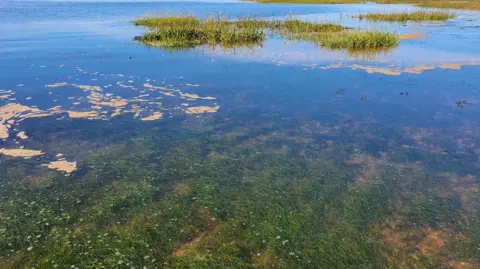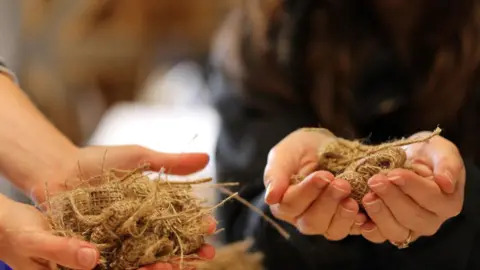'Super' seagrass festival returns to city
 Yorkshire Wildlife Trust
Yorkshire Wildlife TrustA festival showcasing the benefits of seagrass in restoring marine habitats is set to return to Hull for a third year.
The Super Seagrass Festival is taking place at The Deep on 12 and 13 October.
Organisers said it was a chance to learn how seagrass meadows benefited the marine environment and how the plant stores carbon, helping to tackle climate change.
Visitors would also be encouraged to make up hessian seagrass seed bags to be planted at Spurn Point, a spokesperson said.
The festival is part of a five-year project by the Wilder Humber partnership to restore nearly 100 acres (40 hectares) of protected habitats.
The partnership, which includes the Yorkshire and Lincolnshire wildlife trusts and renewable energy firm Ørsted, said that, globally, seagrass captured carbon up to 35 times faster than tropical rainforests and also helped protect coastal areas from damaging storms and erosion.
Katy Duke, chief executive at The Deep, said the festival provided an opportunity for visitors to contribute to the restoration project.
"We look forward to engaging and inspiring our visitors to discover why seagrass is such a vital marine habitat, which needs our help to protect it," she said.
Last year’s festival saw 2,000 seed bags created over the course of the weekend, a figure organisers said they hoped to beat this time.
 Yorkshire Wildlife Trust
Yorkshire Wildlife TrustAndy van der Schatte Olivier, marine programme manager at Yorkshire Wildlife Trust, said involving the local community in seagrass restoration efforts was essential for "safeguarding this vital habitat in the years ahead".
"By collaborating to assemble seed bags, we can all play a hands-on role in restoring this crucial marine species and leave a meaningful legacy in the Humber," he added.
He added they had already seen a rise in the number of species making use of the Wilder Humber seagrass meadows at Spurn, including the critically endangered European eel.
Listen to highlights from Hull and East Yorkshire on BBC Sounds, watch the latest episode of Look North or tell us about a story you think we should be covering here.
